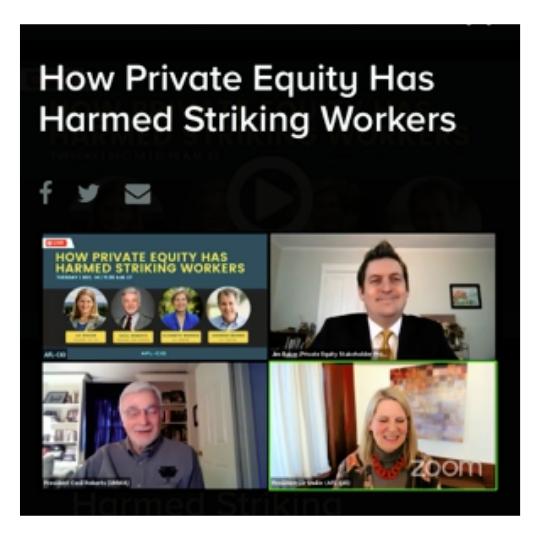
Private Equity Stakeholder Project Joins Senators Warren and Brown, AFL-CIO President Shuler and UMWA President Roberts Calling out the Role of Private Equity at Warrior Met Coal
January 7, 2022
Workers have been on strike in Alabama for nearly 10 months
Since April 1, 2021, 900 mineworkers have been on strike after saving their employer more than $1 billion during and after its bankruptcy through cuts in pay, overtime, vacation, safety, health care, and other benefits. The workers are demanding a fair contract and a restoration of benefits since their employer Warrior Met has returned to profitability — after being floated by the sacrifices of miners and their families.
Earlier this week, Private Equity Stakeholder Project Executive Director Jim Baker joined with AFL-CIO President Liz Shuler, UMWA President Cecil Roberts, Sens. Elizabeth Warren and Sherrod Brown for a press conference on the harm private equity firms have caused striking workers, specifically mine workers in Alabama.
Private equity firms Apollo Global Management, Blackstone, KKR and other owners took almost $800 million in debt-funded dividends from Warrior Met Coal after it was formed out of a bankruptcy reorganization in 2016.
Apollo, Blackstone, KKR and other private equity owners should hold up their end of the bargain with workers and give back the hundreds of millions of dollars they took from Warrior Met to help resolve the strike.
While the world and the global economy continue to struggle with the COVID-19 pandemic, private equity firms have taken advantage of the flood of cheap debt to buy companies at a record pace and to extract debt-funded dividends from companies they currently own.
In the first half of 2021, private equity firms had their busiest six months ever, announcing 6,300 deals worth $513 billion.
As private equity firms and deals have grown, they have come to impact growing numbers of people. Based on reports by the private equity industry‘s main lobbying group, the number of US employees at private equity-owned companies has increased substantially in recent years – from 8.8 million at the end of 2018 to 11.7 million at the end of 2020, a 33% increase. This increase is striking as overall US employment dropped by 5% over the same period.
Academic studies show that private equity takeovers typically result in job losses at acquired companies. So this increase appears to be largely driven by private equity firms acquiring more and larger companies – putting the jobs of millions more US workers at risk.
In addition to using record levels of debt to acquire new companies, in the past year private equity firms have also added record amounts of debt to the balance sheets of portfolio companies they already own to finance dividend recapitalizations, or debt-funded dividends.
Dividend recapitalizations do nothing to grow private equity-owned businesses but instead are a way for private equity firms to extract cash from these companies for themselves.
Senators Warren, Baldwin and Sanders sent a letter in November to Apollo and Blackstone as the private equity firms “appear to have made off like bandits” in the Warrior Met maneuverings.
The actions of Apollo, Blackstone, and KKR at Warrior Met illustrate private equity’s “heads I win, tails you lose” structure.
Warrior Met workers made a $1 billion sacrifice in pay, overtime, vacation, safety, health care, and other benefits.
Private equity firms Apollo, Blackstone, and KKR – conditioned their takeover of the company on the court rejecting employees’ collective bargaining agreement.
Meanwhile, retirement benefits for over 2,700 coal miners and their dependents were transferred to the US Government Pension Benefit Guarantee Corp.
Rather than holding up their end of the bargain, private equity firms Apollo, Blackstone, and KKR took the money and ran, paying themselves and other owners almost $800 million in debt-funded dividends shortly after the company emerged from bankruptcy.
This is in addition to the more than $300 million these and other owners made selling shares in the company’s April 2017 IPO and the hundreds of millions of dollars more they have made selling shares since.
Former Apollo CEO Leon Black made at least $225 million last year and has a net worth of more than $10 billion. Black stepped down earlier this year after an investigation found he had paid $158 million in fees to Jeffrey Epstein. Apollo has $481 billion in assets.
Blackstone Chairman and CEO Stephen Schwarzman made at least $615 million last year and has a net worth $38.5 billion. Blackstone itself has $731 billion in assets.
KKR co-founders Henry Kravis and George Roberts took home around $90 million each last year and are worth $9.3 billion and $9.8 billion respectively. KKR has $459 billion in assets.
